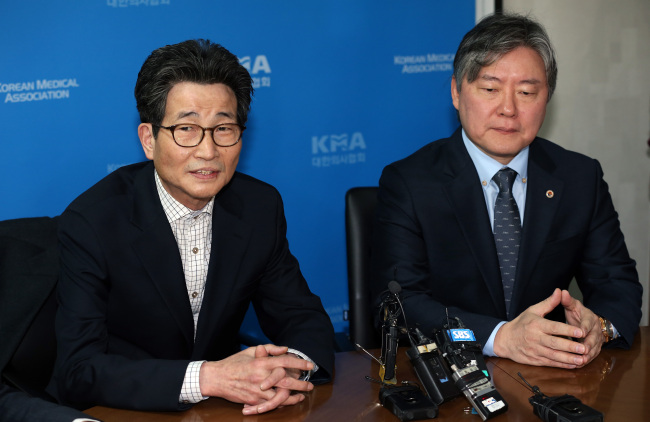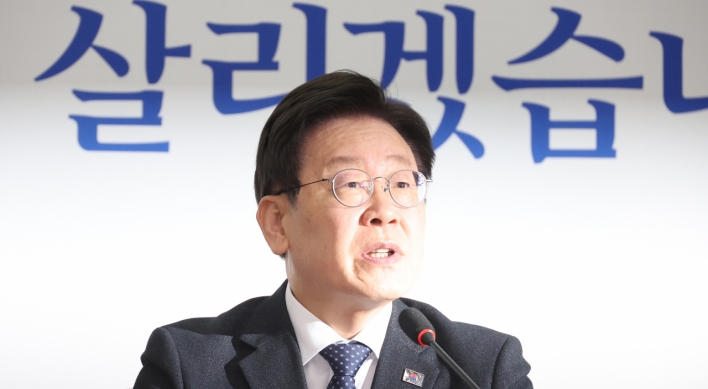Concerns about the country’s health services are growing as doctors plan to launch further industrial action later this month, despite stern warnings from the government.
On Monday, thousands of doctors staged their first strike in 14 years to protest the government’s push to introduce telemedicine and for-profit subsidiaries for hospitals.
President Park Geun-hye warned against doctors joining the nationwide strike, saying their actions were unacceptable and put lives in danger.
The Korean Medical Association, the group of doctors that led the strike on Monday, is planning to launch its second protest on March 24 for six consecutive days. The second strike may have a more serious impact than the first, as staff from emergency rooms and intensive care units center will join the move. Doctors working in emergency rooms and intensive care units were excluded from Monday’s strike.
On Monday, thousands of doctors staged their first strike in 14 years to protest the government’s push to introduce telemedicine and for-profit subsidiaries for hospitals.
President Park Geun-hye warned against doctors joining the nationwide strike, saying their actions were unacceptable and put lives in danger.
The Korean Medical Association, the group of doctors that led the strike on Monday, is planning to launch its second protest on March 24 for six consecutive days. The second strike may have a more serious impact than the first, as staff from emergency rooms and intensive care units center will join the move. Doctors working in emergency rooms and intensive care units were excluded from Monday’s strike.

The Ministry of Health and Welfare estimated that about 6,000 clinics nationwide, or 21 percent of the total, joined the strike on Monday. The Korean Medical Association gave a higher estimate.
Nearly 50 percent of the country’s local clinics halted their operations, it said, adding that more than 7,100 medical residents also took part in the strike. About 17,000 medical residents work at 230 hospitals across the nation.
Until the second wave of industrial action begins, doctors said they would limit medical consultations to 15 minutes per patient. Medical residents will wear black ribbons on their gowns to protest against the state’s new medical plans
With doctors vowing to stage the strike, the government said it would take administrative measures against clinics that halted their operations. Doctors may face suspensions of up to 15 days.
The doctors claim that telemedicine, which allows doctors to use communications technology to help treat patients in remote areas, will only benefit large hospitals and damage the businesses of neighborhood doctors. They also argue that government plans to allow hospitals to own for-profit subsidiaries will accelerate the privatization of the medical sector.
Doctors also complain about the low medical fees that they receive for providing treatment.
Under the Korean medical system, most treatment and surgery fees are determined by the state. Doctors claim that these fees are unrealistically low and have caused them financial difficulties, but they have failed to win public support for an increase, as their profession has traditionally been regarded as well-paid, and the low costs benefit patients.
Ahead of the scheduled second strike later this month, the KMA will press the government to return to negotiating table.
KMA president Roh Hwan-kyu urged the Health Ministry to hold talks and accept their demands. The government, however, refused to talk, saying the doctors’ actions were illegal and unjustified.
Lawmakers from the main opposition Democratic Party expressed concerns Tuesday over the second strike, but promised to play an active role in mediating with the government.
“We are planning to suggest that the ruling party and the government to form a countermeasure committee for medical issues in the parliament’s welfare committee. Let us find a solution together with the government, the KMA and lawmakers,” DP Rep. Rhee Mok-hee said in a meeting with the chief of the KMA.
By Lee Hyun-jeong (rene@heraldcorp.com)




![[Herald Interview] 'Amid aging population, Korea to invite more young professionals from overseas'](http://res.heraldm.com/phpwas/restmb_idxmake.php?idx=644&simg=/content/image/2024/04/24/20240424050844_0.jpg&u=20240424200058)







![[Hello India] Hyundai Motor vows to boost 'clean mobility' in India](http://res.heraldm.com/phpwas/restmb_idxmake.php?idx=644&simg=/content/image/2024/04/25/20240425050672_0.jpg&u=)





![[Today’s K-pop] NewJeans' single teasers release amid intrigue](http://res.heraldm.com/phpwas/restmb_idxmake.php?idx=642&simg=/content/image/2024/04/26/20240426050575_0.jpg&u=)